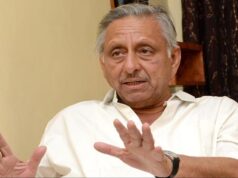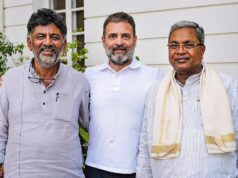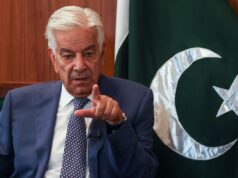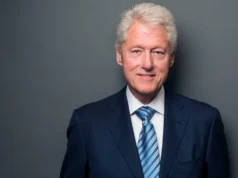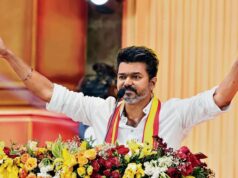Peace in our time, then. Why not? Donald Trump, who gathered his cabinet and the media in the White House, had a compelling story to share at the Nobel committee’s annual gongs in Oslo.
Peace has arrived in Gaza after two years of Israeli hostage-taking, death, damage, and famine. The guy in the Oval Office, who has made no secret of his ambition to be recognized as the president of peace, was in the process of brokering a historic agreement between Israel and Hamas.
The situation in Gaza is so dire that it would be churlish to attribute the primary focus of the cabinet meeting to self-serving intentions.
However, the timing was, let’s say, fortuitous.
Today is Thursday; coincidentally, the Nobel Prize winner will be revealed on Friday.
However, Trump was all politeness and restraint—at least on that specific issue alone—despite his prior displays of desire for the same prize given to Barack Obama bordering on avarice.
With the exception of one reporter toward the end who asked about Trump’s thoughts on the prize, no one used the N word during the 70-minute meeting.
He declared confidently that “peace in the Middle East” was on the horizon.
No aspiration being too high, he continued, “I think it’s going to be a lasting peace, hopefully an everlasting peace.”
When the 20 or so Israeli hostages who are still alive are freed on Monday or Tuesday, the president declared, “It will be a day of joy.”
In the streets, they are dancing. They’re overjoyed. Everyone is content. I have never witnessed anything like what they are doing as they dance in the streets of Arab and Muslim nations.
The president added generously that everyone in his vicinity should be given credit. I thought you were amazing, JD [Vance]. And you were excellent, Pete [Hegseth]. Marco Rubio was outstanding. Some of you were really involved, after all. Almost everyone in this room was involved, I believe. I want to express my gratitude to White House Chief of Staff Susie [Wiles]. You were amazing. and his personal emissary, Steve Witkoff, comes next.
However, Rubio, the interim national security adviser and secretary of state, was left to provide the Nobel committee in Norway the crucial indication.
It is not hyperbole to suggest that without the president, none of this would have been possible. I am not sure if the full narrative will be published regarding yesterday’s events one day. The man who Trump once called “little Marco” exulted, “without the president of the United States being involved.”
The cabinet gave that a round of applause, the second of the meeting; the first being for Trump’s declaration at the start that Columbus Day will now be a national holiday on the second Monday in October.
Rubio found his topic endearing. The accomplishment encapsulated Trump’s personality and went beyond dry geopolitics.
“It was a human story yesterday,” he added. “And as a result of your efforts.” Additionally, because of your actions that are unrelated to this, as well as because of who you are, what you have done, and how you are perceived, not only is there no other leader in the world who could have put this together, Mr. President, but I honestly don’t know of any American president in the modern era that could have made this possible.
This meeting would not have been complete without some discordant notes, but it was still a Trump cabinet meeting.
The stark contrast between the Middle East’s promise of peace and harmony and America’s looming threat of war, or at least civil strife, provided them with what they needed.
Trump only had positive things to say about Middle Eastern nations who he claimed supported his peace agreement, including Iran, which he had destroyed but now stated he wanted to see rebuilt.
However, a “enemy from within” had to be faced here at home. To demonstrate to elected local Democratic mayors and governors who were in charge, troops were to be sent onto the streets of US cities.
Homeland Security Secretary Kristi Noem said she visited Portland and met with the governor, the mayor, the chief of police, and the superintendent of the highway patrol.
She charitably said, “They are all dishonest, lying, and disingenuous people because they make the exact opposite response as soon as you leave the room.” This is probably because the officials’ descriptions of their city were a little more tranquil than the conflict zone in Noem et al.’s frantic account.
JD Vance, however, took the prize for low blows. He saw that Trump’s early achievement in putting an end to violence in the Middle East was the meeting’s common thread, but he was unable to see that this called for an act of civility on his part.
At cabinet meetings, the vice president has been known to mimic his boss’s jokes with fake laughing.
This time, he determined that the best course of action was to appropriate one of Trump’s well-known jabs for his own purposes, at the cost of Senate Democratic leader Chuck Schumer.
According to Vance, “the president of the United States, a billionaire real estate investor from New York, and one of the most well-known New Yorkers worldwide, obviously interacts with a lot of people who are very pro-Israel.”
He then went on to say, “He also, of course, knew one of the most famous Palestinians in the world, Chuck Schumer,” possibly understanding that he could not match the ecstatic heights of Rubio’s testimonial.
People laughed at the crack. It is among Trump’s most vile insults directed against Schumer, a fellow New Yorker who is a fervent friend of Israel and proudly Jewish. Rereading it at this point struck a particularly dissonant note given the current context.
It appears that JD secretly hopes to become a comedy king. Maybe a missed calling. However, someone needs to explain timing and context to him.
